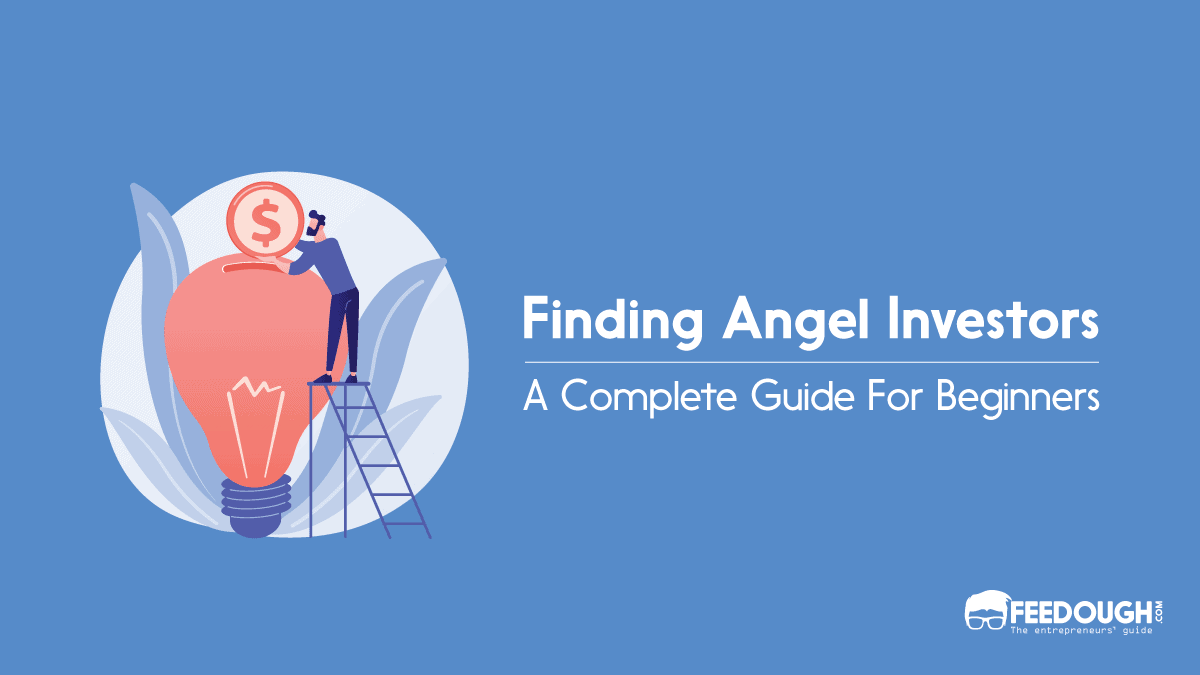Fundraising is one of the trickiest games that startup founders are expected to master. While several investors fund startups with developed MVPs, few invest in developing ideas; one of these few is business angels.
Yes, angels put their money in the earliest stages of startups when the risk is maximum. However, it is not easy to find the right angel investor for one’s startup. Where do you find one? How to know if it’s the right investor fr you? How do you reach out to them?
Fret not. We have curated this step-by-step guide to find the perfect angel investor for your startup.
Is Angel Investor the Right Fit for You?
Before answering the question of ‘How?’, we would like you to be sure about approaching an angel.
Angel investors are high net worth individuals who fund startups in exchange for around 20-40% of equity. They support risky business ventures, usually at their most uncertain stages. Hence, they are called business angels.
They may be accredited investors, who are mostly entrepreneurs with big earnings from their previous businesses. Hence, they may also tend to be great mentors who provide guidance, valuable contacts, and suggestions for growth.
Sometimes, your friends and family may support your business in its initial days. Although they might not be accredited investors, they fall under the category of angels.
Angel investors invest around $15K to $250K in a business. Combined with other offerings by business angels, this amount helps grow your business. Also, unlike VCs, angel investors usually fund you because they believe in your idea and vision. They are more concerned about business-building than lucrative exits. So, even though they might not go for further funding rounds, they tend to be invaluable.
However, you must be ready to give up a considerable proportion of equity this early. Money and a capable board member are worth a huge price, right?
So, ponder over your business and your vision for it. Talk to the team, consider your immediate and long-term goals, and see if an angel investor is the right fit. Remember that there are other equity and debt funding options you can choose from.
How Should You Find Angel Investors for Your Startup?
If you decide to go forward with angel investing, you have to outline your expectations from the person.
You need to be sure about the type of investor you need before you start looking for the right one. Fundraising introduces you to many types of angel investors. While some of them are ready to mentor you, the others prefer sitting passively on the board. While some invest purely for profits, others believe in making an impact. While some angels are industry experts, the others are there because of a friendly tip.
Trust us, finding the right angel investor is a tough nut to crack. It requires extensive research, collaboration, and deliberation.
Firstly, you need to prepare a list of angel investors that suit you. Then, you can approach them, ensure that they are the right fit, and woo them to get them on board.
Talk To Your Network
The best way to find an angel investor is through your network. Your trusted professional and personal contacts might be acquainted with angels or people who have worked with them. The network includes high net worth friends, family, acquaintances, or people who have received funding from angel investors.
Convey your requirements, and they might suggest to you whom to approach.
Talk to people and get as many names as possible, but don’t shy away from background checks. List all the potential angel investors to approach and then proceed to the next steps.
Network More
After you are done with scouting your network, start meeting more people through online and offline channels. Aim for entrepreneurs and investors who might be your perfect match or at least guide you to them.
Online platforms are the best for this purpose. They hold great personal and professional networking potential. The sheer number and diversity of the people you can approach online make it one of the best ways to look for prospective angel investors.
Special Websites
Platforms like Angel Capital Association, Gust, Angel Forum, etc., are specifically designed to help entrepreneurs like you to meet angels.
- ACA or Angel Capital Association is an organisation of accredited angel investors, be it individuals, groups, or family offices. You can go through their directory of angel groups, accredited platforms, and organisations affiliated with ACA here. Although they don’t list individual investors for privacy reasons, you can meet them by attending the organisation’s events. You may also use their learning material to understand angel investing better and get real-time information about angel investing.
- Angel Forum: Angel Forum is a long-serving angel network that helps startups raise capital by facilitating networking. They arrange events and help you connect and engage with industry experts. Here, you can pitch your business and even arrange a face-to-face meeting with the angel investors.
- Gust: Contrary to ACA, Gust is a platform for entrepreneurs. It provides tools and resources to help founders build companies, grow them, and raise funds. This platform works differently from the other two. Here, you just sign in, give details about your company and they will recommend you the best place to find capital.
Business Community Building Platforms
Angel List, Startup Grind, Startup Nation, and other business community-building platforms aim to build a startup (and/or business) ecosystem. Entrepreneurs, angels, VCs, incubators, industry experts, consultants, etc. are members of these platforms. Here, you can meet and network with the best angels. Others like entrepreneurs, consultants, and VCs here may also guide you.
Social Media Platforms
Social channels like Twitter and Reddit threads, Facebook communities, and other community forums are unconventional but great ways to find angel investors. Lately, Clubhouse has been providing a healthy space for entrepreneurs to connect with investors. Several clubs schedule audio meet-up sessions that accredited investors and experts attend.
You may also find your prospective investors on professional networking platforms like LinkedIn and LunchClub.
Just remember to maintain credible and updated accounts on these platforms, and you are free to connect and engage with professionals.
Look Upon The Internet
Several websites like Eqvista, Crunchbase, and Pitchbook release their curated lists of angel investors. You can go through them, do background checks, and add the investors that suit your niche, region, and requirements. While Pitchbook requires you to pay, you can access the list curated by Eqvista and Crunchbase by clicking on the links.
You may also search for angel investors around you on the web and get acquainted with their names and other details.
Snoop In On Your Competitors
Checking the activities of other players in your industry will help you get acquainted with the best investors and investment practices. Many pre-seed and seed-stage businesses might be raising funds. Competitor analysis will make your job easy.
For this, you can use business information platforms like Pitchbook, Crunchbase, cbinsights.com. While Crunchbase and CB Insights are paid services, you might avail of their free trials.
Don’t Ignore Angel Groups And Family Offices
Many a time, angels invest through family offices and angel groups.
Angel groups are groups of angels working together. They pool money, decide where to invest, and then fund businesses like yourself. Although they tend to provide more capital than regular angel investors, angel groups are often ill-managed, time-intensive, and incompetent. So, research well before approaching an angel group.
Websites like ACA and Startupedia have curated lists of angel groups for your reference. You may find them on the given links.
On the other hand, family offices are the organisations that invest on behalf of angels and their families; they function like hybrids between angel investors and VCs. Family offices also tend to be time-consuming, inefficient, and even insufficient. So, don’t forget to do your research before approaching them.
You may refer to the following lists:
- Crunchbase’s list of family offices
- SWFI’s list of family offices
- SWFI’s list of family offices (listed regionally)
How To Reach Out To The Angel Investors In Your List?
After you have your list of angel investors prepared, you can start reaching out to them. However, keep in mind that angels (or other investors, for that matter) invest through referrals. They usually don’t even listen to the founders that are not referred by an acquaintance.
So, your next job is to secure a warm introduction to the investors on your list.
Scout Your Network Again
Ask the people in your network to introduce you to the angels they know. The ones who have helped you add names to the list can surely help you out here. Also, if you look enough, you may find a common acquaintance with the other shortlisted angels.
Make New Acquaintances
You will find the data of the companies these investors have worked with on their websites. So, look at their portfolios, connect with the entrepreneurs they have worked with, and convince them for a warm introduction.
If this doesn’t work, you may send cold emails to these entrepreneurs. Trust us, you will be surprised by the number of people who respond.
However, you must remember to send them a short description of yourself and your endeavour. This decreases their work and makes these entrepreneurs more excited to help you.
Connect Directly
If the other two techniques don’t work, you are left with no option but to connect with the angels directly. They are busy people getting bombarded with hundreds of emails each day, so there is a high chance that they won’t revert. So, be creative and on-point with your outreach, and target more people to increase your chances.
Many investors have ‘contact us’ forms on their websites. You may also fill them in and wait for a response.
Some Friendly Suggestions and Advice
Finding angel investors in the early stages of your business is an uphill struggle. You may have more rejections than you can imagine. But this doesn’t mean you are doing something wrong. Keep yourself motivated and try to follow these fundraising suggestions and advice (they came from our experience).
Use Offline Channels For Networking
Although redundant, local business communities, coworking spaces, and offline gatherings are great ways to meet prospective angel investors or people who will be angels in the future. Also, since face-to-face interaction adds a personal touch to your pitch, this helps you win over the investors more easily.
Attend Pitch Events
Pitch events are great occasions to meet are entrepreneurs, investors, and industry experts looking for businesses to fund. Although you might not secure capital through such events, they are a great way to meet people who would introduce you to angels.
Always Do A Background Check
No matter how you come across an angel, always do thorough research. Check their portfolios, anti-portfolios, and talk to the entrepreneurs they have previously worked with. Make sure to connect with the companies that they invested in and didn’t perform well.
Use Intermediate Channels
Several platforms match businesses with their preferred kinds of investors. They require you to fill in the relevant details about your business and its requirements. Based on that, they match you with prospective investors.
Examples of such platforms are:
- FundersClub
- Seed Invest
- Invstor
- Funded.com
These channels reduce your work to a considerable extent. However, they are still not popular and are not used by a majority of angels.
Don’t Leave Empty-Handed
If you have an angel in your list of prospective ones, make sure that you cultivate a relationship with them. They might not be interested in your venture but get them interested in yourself. This will help you out in the future.
Go On, Tell Us What You Think!
Did we miss something? Come on! Tell us what you think of this article on how to find angel investors in the comments section.
A finance enthusiast, literature beau and lifelong learner. Working her way up the success ladder and her personal philosophy textbook, Kavvya believes that a good conversation is worth more than a good book. When not working, she can be found reading, writing and engaging in long walks.



![AI Porter’s Five Forces Analysis [Unlimited & No Login] Porter’s Five Forces Analysis Generator](https://www.feedough.com/wp-content/uploads/2024/12/Porters-Five-Forces-Analysis-Generator-150x150.webp)





